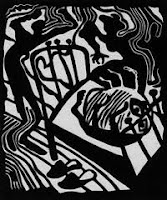In Excess, Access, and the State of our Souls I suggested that the great divide in much of our world is between those trying to climb out of the darkness of poverty and those who have slid all the way down the other side to lives of detached comfort. And I proposed that detached comfort is its own darkness, more insidious than poverty because it is bereft of striving for escape. The poor can strive to escape poverty, after all, but do the successful or comfortable strive to escape success or comfort?
“MasterCard, I’m bored” says the roughly handsome, gravelly voiced actor, and the commercial responds to a cacophonous sequence of stimulating “opportunities” for distraction from boredom. Kids pile out of the family van at the Grand Canyon and instead of looking at the canyon, eagerly sit in front of a large-screen television showing the same image. The mother who found meaning raising her grown kids, the professional who retires…at some point many who are comfortable or successful begin to sense that there is something that has been lost. But in Excess, Access, and the State of our Souls I suggested that the climb out of the darkness of comfort is difficult. It’s hard to get a grip.
Kathy and I were visiting our son in Europe when we happened upon a May Day celebration, with all attention on the climbing of a Maypole. With German music playing and lots of beer flowing, a few men would swagger up to the pole and make very serious attempts to climb up. They would wrap their arms around the smooth wooden pole, then wrap their legs around, and by alternating grip on their arms and legs, try to “shinny” up. As we watched, it became clear that the more clothing that they wore, the greater their disadvantage. Their sleeves and their pants legs would kind of roll back every time they re-gripped the pole. Their progress was kind of two feet up, one foot back. Eventually this would exhaust them. Those observing this began to roll up their sleeves, remove their shirts, and even roll up their pants legs, and they came closer to the top before eventually giving up and sliding down. Finally an inebriant stripped down to his jockey shorts, trying to keep his back to as much of the crowd as possible, and was able to shinny up without the impediment of sleeves or pants legs.
In order to get a grip, he needed to abandon those things that made him appear decent. I wouldn’t have done that. I would have been embarrassed. I think that to the extent that we are comfortable, we face the same dilemma. To climb out of the ennui or lack of meaning that we experience, we need to get a grip on life enough to climb out of comfort. It can be humiliating. We can appear foolish.
Yoga socks? I have learned that on cold mornings when I’d like to do yoga before the heat comes on, my temptation to put on warm socks is foolish. Like the Germans shinnying up that maypole, my feet slip out of the socks. So I deal with cold feet, and find that it’s not long before the exercise warms them up. When I walk along the snowy roads up and down our peninsula here in northern Michigan, I find I warm up going uphill and cool off coming down. The uphill climb toward a life of justice warms us. But there is in this argument so far a foolishness born in individualism.
Tomorrow, the answer of the San Francisco cable cars.












